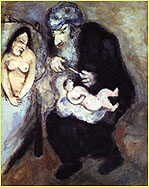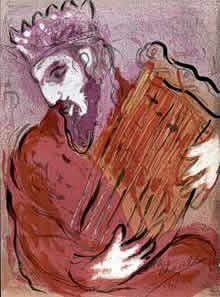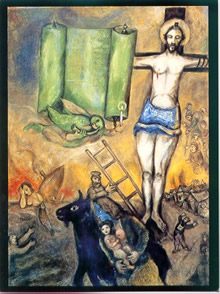
|
One New Humanity: Salvation is from the Jews
For Sunday July 19, 2009
Lectionary Readings (Revised Common Lectionary, Year B)
2 Samuel 7:1–14a or Jeremiah 23:1–6
Psalm 89:20–37 or Psalm 23
Ephesians 2:11–22
Mark 6:30–34, 53–56
 |
God covenants to make Abraham a father of many nations, Marc Chagall, 1931. |
A few weeks ago I attended a Jewish shiva at a friend's house in our neighborhood. In Hebrew shiva means "seven," and in this instance refers to the week-long ritual of mourning for a loved one who has died. About thirty of us gathered in the back yard to honor Bobby's life. A young woman rabbi led us in a series of readings from a small booklet, about half of which we recited in English and half of which she chanted in Hebrew. Family members then shared fond memories of a life that was cut way too short way too quickly.
Half way through the thirty-minute service I experienced a jolt when we recited together the Psalm for this week, that most beloved of all passages in Scripture, Psalm 23: "The Lord is my shepherd, I shall not want, He makes me lie down in green pastures. He leads me beside quiet waters and restores my soul." If I had shut my eyes, I could have imagined myself to be worshipping in any church in the world. How remarkable, I thought, that this Jewish service should be so "Christian."
Later, and especially as I reflected on Paul's remarks to the Ephesians for this week (2:11–22), I had a brilliant glimpse of the obvious. And upon further reflection, I also realized how tragically typical my thinking was and how attitudes like mine across the last two millennia have done so much damage in Jewish-Christian relations.
My friend's shiva was not "Christian." No, my Christianity was Jewish.
As a Gentile, I had it backwards. Christians are not the "we" and Jews "them." It would be more theologically accurate for Jews to see themselves as "us" and Gentiles like me as "them." That, in essence, is what Paul tells the Gentile followers of Jesus in Ephesus. And he goes even further, rejecting all such us-against-them rhetoric and we-they antagonisms in favor of one harmonious humanity.
The Old Testament text for this week makes a clever and important play on words. We read how King David, who enjoyed his own regal "house" (= palace), wanted to build a "house" (= temple) for Yahweh. But that was not to be. Instead, Yahweh would build a "house" ( = dynasty) for David: "When your days are over and you rest with your fathers, I will raise up your offspring to succeed you, who will come from your own body, and I will establish his kingdom. He is the one who will build a house for my name, and I will establish the throne of his kingdom forever. . . Your house and your kingdom will endure forever before me; your throne will be established forever."
 |
King David, stone stele, by Marc Chagall. |
The Psalmist for this week repeats this Davidic promise: "I will maintain my love to David forever, / and my covenant with him will never fail. / I will establish his line forever, / and his throne as long as the heavens endure" (Psalm 89:28–29). The first story-tellers of Jesus go to great lengths to identify these Davidic promises with Jesus himself. He is the long-awaited Jewish messiah and Son of David.
And so all of the first followers of Jesus were, quite naturally, only Jewish. Most people in the decades after the death and resurrection of Jesus construed his followers as a sect of Judaism, which in fact it was. Even the so-called anti-semitism in the Gospels, says Paula Fredriksen in her new book Augustine and the Jews (2008), is a misleading anachronism. Horrendous anti-semitism would come later, but initially, says Fredriksen, the denunciation of Jews in the gospels are "fraternal name calling" within Judaism. The acrimony and denunciations, she says, "were one of the most unmistakably Jewish things about the Jesus movement."
But bit by bit and across the years, as already hinted at in the Gospels themselves, Gentiles began to follow Jesus. This raised an obvious question. How, if at all, could impure Gentiles fit into this Jewish story of salvation? In his remarks to the Gentile believers at Ephesus, Paul uses the most unflattering language to describe their dilemma. Just remember, he says, you uncircumcised Gentiles were "separate from (the Jewish) Christ, excluded from citizenship in Israel and foreigners to the covenants of the promise, without hope and without God in the world." Gentiles, he says, are "far away" in space and time to the Davidic promise of salvation that was fulfilled in Jesus.
Paul uses a different metaphor to make a similar point when he writes to the Gentile believers in Rome. The Jews are "natural branches." Gentiles are "a wild olive shoot" that has been "grafted in among the others and now share in the nourishing sap from the olive root" (Romans 11:17). "You (Gentiles) do not support the (Jewish) root, but the root supports you." Or as Jesus himself bluntly puts it to the Samaritan woman at the well, "salvation is from the Jews" (John 4:22). Gentiles do well to remember their honorary, guest status.
It's no wonder that Paul describes the inclusion of Gentiles as a mystery. "This mystery is that through the (Jewish) gospel the Gentiles are heirs together with Israel, members together of one body, and sharers together in the promise in Christ Jesus" (Ephesians 3:6). Gentiles who were "far away" have been "brought near" in Jesus. The foreigners have been made fellow citizens, the aliens have been adopted into God's family.
 |
Marc Chagall, "Yellow Crucifixion" (1943). |
Paul summarizes the meaning and message of Jesus in a single word: "He himself is our peace." Beyond the many antagonisms of religion, ethnicity, race, class, and gender (we could extend this tragic list), Jesus "made the two one and has destroyed the dividing wall of hostility. His purpose was to create in himself one new man out of the two, thus making peace, and in this one body to reconcile both of them to God through the cross, by which he put to death their hostility" (Ephesians 2:14–18).
Such is the radically egalitarian standing of all humanity before a loving and impartial God. In this new humanity, Paul tells both the Colossians and the Galatians, "there is no Greek or Jew, male or female, circumcised or uncircumcised, barbarian, Scythian, slave or free, but Christ is all, and is in all" (Colossians 3:11; Galatians 3:28).
Paula Fredriksen thus argues that Paul, who described himself as both a "Hebrew of Hebrews" (Philippians 3:11) and "apostle to the Gentiles" (Romans 11:13), never "intended to replace Judaism outright with brand-new Christianity." From first to last, she says, Paul remained thoroughly Jewish. He hoped to convert Gentiles into "honorary" Jews, not to convert Jews into Christians. The tragic irony of this, and the main point of Fredriksen's book, is that "the parting of the ways between Christianity and Judaism was by no means inevitable." FN: On Fredriksen's book see Peter Brown, "A Surprise from Saint Augustine,"" NYRB (June 11, 2009), pp. 41–42.
For further reflection:
* See Jacob Neusner, A Rabbi Talks with Jesus (1993, revised edition 2000), Judaism in the Beginning of Christianity (1997), and Judaism When Christianity Began: A Survey of Belief and Practice (2002).
* Read Acts 10–11 about Peter's conversion to acceptance of Gentiles, and Acts 15 about the consternation of the Jewish followers of Jesus upon hearing that Gentiles were converting.
Image credits: (1) Time, Inc; (2) Galerie Art, Czech Republic; (3) Jeremy D. Popkin, University of Kentucky.





